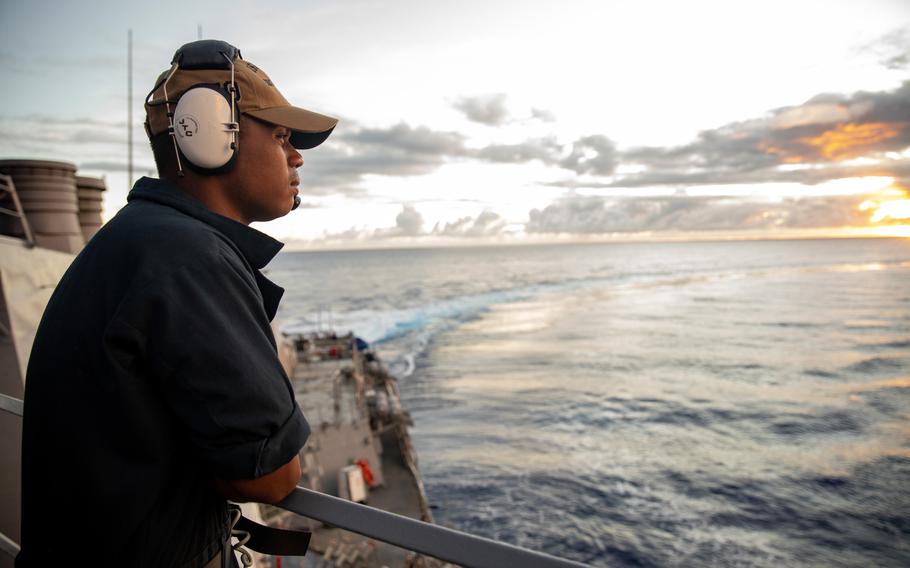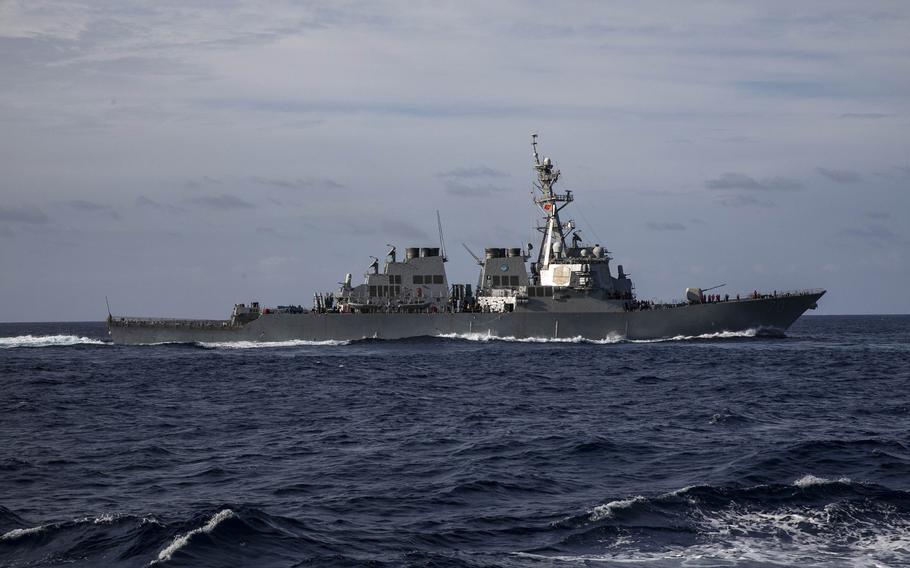
A sailor stands look out on the USS Hopper as it steams through the Philippine Sea on Oct. 30, 2023. The Hawaii-based USS Hopper sailed near the Paracel Islands to assert “navigational rights and freedoms,” the U.S. 7th Fleet announced Sunday in a news release. (Victoria Mejicanos/U.S. Navy)
Beijing claims the United States is pursuing a “hegemony” in the South China Sea after a Navy guided-missile destroyer steamed near a chain of islands there to dispute what it views as unlawful restrictions.
The Hawaii-based USS Hopper sailed near the Paracel Islands to assert “navigational rights and freedoms,” the U.S. 7th Fleet announced Sunday in a news release.
China responded by calling the U.S. a “security risk creator” and said the operation was “ironclad evidence that it is pursuing ‘navigational hegemony’ and “militarization of the South China Sea,” Chinese air force Col. Tian Junli, Southern Theater Command spokesman, said in a news release.
Beijing organized ships and aircraft to “track, monitor and warn away” the Hopper, he said.

The guided-missile destroyer USS Hopper steams through the Pacific Ocean on Nov. 9, 2023. (Charles Scudella/U.S. Navy)
The Paracels, a chain of reefs, shoals and islands about 350 miles south of mainland China and 300 miles east of Vietnam, is claimed in its entirety by China, Vietnam and Taiwan. Beijing, however, maintains about 20 outposts in the islands, according to the CIA’s World Factbook website.
The Navy routinely operates near the Paracels and the Spratly Islands, another contested island chain in the South China Sea, to protest restrictions on innocent passage. In the Paracels, all three claimants require either permission or advance notice before a military vessel travels through the area, 7th Fleet said in the news release.
“By engaging in innocent passage without giving prior notification to or asking permission from any of the claimants, the United States challenged these unlawful restrictions imposed by [China], Taiwan, and Vietnam,” 7th Fleet spokeswoman Lt. Kristina Wiedemann wrote in the news release. “The United States demonstrated that innocent passage is not subject to such restrictions.”
The 7th Fleet did not immediately respond to an email request for additional information Sunday.
Another destroyer, the USS Dewey, cruised within 12 nautical miles of outposts in the Spratlys on Nov. 3 as part of a “routine and peaceful exercise of rights and freedoms,” 7th Fleet spokesman Lt. Luka Bakic said at the time.
Restrictions on innocent passage violate the United Nations Convention on the Law of the Sea, an international agreement that generally governs both civil and military maritime activities.
The convention has been signed and ratified by 168 of the 193 U.N. member states, although the U.S. has yet to ratify the convention despite widespread support. President Ronald Reagan in 1982 declined to sign the convention due to deep seabed mining provisions, according to the State Department’s website.